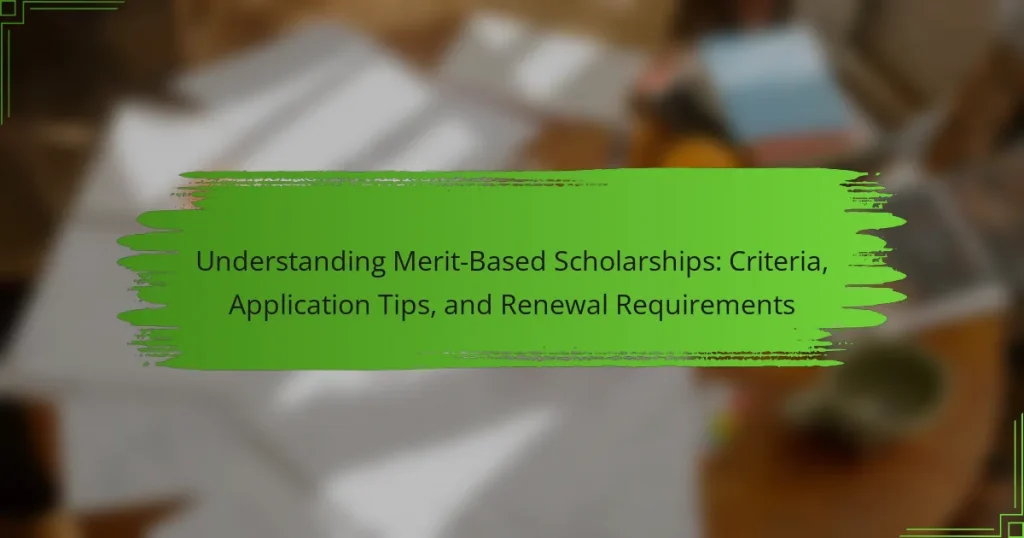
What are Merit-Based Scholarships?
Merit-based scholarships are financial awards given to students based on their academic, artistic, or athletic achievements. These scholarships do not consider financial need. Instead, they recognize outstanding performance in specific areas. For instance, students may qualify through high GPA, standardized test scores, or exceptional talent. According to the National Scholarship Providers Association, over $7 billion is awarded annually in merit-based scholarships. This funding helps reduce the cost of education for high-achieving students.
How do Merit-Based Scholarships differ from other types of financial aid?
Merit-based scholarships differ from other types of financial aid primarily in their criteria for awarding funds. Merit-based scholarships are awarded based on a student’s academic achievements, talents, or extracurricular involvement. This contrasts with need-based financial aid, which is determined by a student’s financial situation and family income. Merit-based awards do not require recipients to demonstrate financial need. According to the National Association of Student Financial Aid Administrators, merit-based scholarships can significantly reduce the cost of education for high-achieving students. Additionally, they often come with specific renewal requirements tied to maintaining a certain GPA or continued involvement in particular activities.
What are the main characteristics of Merit-Based Scholarships?
Merit-based scholarships are financial awards given to students based on academic, artistic, or athletic achievements. These scholarships do not consider financial need. Eligibility often requires maintaining a specific GPA or performance level. They can be awarded by schools, organizations, or private donors. Merit-based scholarships encourage high performance and recognize talent. For instance, the National Merit Scholarship Program awards scholarships based on standardized test scores. According to the National Merit Scholarship Corporation, over 1.5 million students enter the competition each year. This demonstrates the competitive nature of merit-based scholarships.
Why are Merit-Based Scholarships important for students?
Merit-based scholarships are important for students because they reward academic achievement and talent. These scholarships provide financial assistance, reducing the burden of tuition costs. They can also enhance a student’s resume, showcasing dedication and excellence. Many colleges and universities use these scholarships to attract high-performing students. According to the National Scholarship Providers Association, merit-based awards account for a significant portion of financial aid. This support can lead to lower student debt after graduation. Additionally, receiving a merit scholarship can motivate students to maintain high academic standards. Overall, merit-based scholarships play a crucial role in making higher education more accessible.
What criteria are used to evaluate applicants for Merit-Based Scholarships?
Merit-based scholarships evaluate applicants based on academic achievement, standardized test scores, extracurricular involvement, and leadership qualities. Academic achievement typically includes high GPA and class rank. Standardized test scores such as SAT or ACT are often considered. Extracurricular involvement reflects participation in clubs, sports, or community service. Leadership qualities may be assessed through roles in school or community organizations. Many scholarship programs also require recommendation letters and personal essays to evaluate character and motivation. These criteria aim to identify students who demonstrate excellence and potential for success in their academic pursuits.
How does academic performance influence scholarship eligibility?
Academic performance significantly influences scholarship eligibility. Many merit-based scholarships require a minimum GPA or standardized test score. High academic achievement demonstrates a student’s commitment and capability. Scholarship committees often use these metrics to assess potential. For example, a 2019 study by the National Scholarship Providers Association found that 78% of scholarships considered GPA as a primary criterion. This statistic underscores the importance of maintaining strong academic performance. Additionally, exceptional grades can lead to more scholarship opportunities. Students with high academic standing often receive invitations to apply for exclusive scholarships. Therefore, academic performance is a crucial factor in determining eligibility for many scholarships.
What role do extracurricular activities play in the selection process?
Extracurricular activities play a significant role in the selection process for merit-based scholarships. They demonstrate a student’s commitment, leadership, and time management skills. Many scholarship committees look for well-rounded candidates who engage in diverse activities. Participation in sports, clubs, or volunteer work can set applicants apart. Research indicates that 70% of scholarship providers consider extracurricular involvement as a key factor in decision-making. This involvement often reflects personal interests and dedication beyond academics. Ultimately, strong extracurricular records can enhance an applicant’s overall profile and increase scholarship opportunities.
Are there specific demographic factors considered in the evaluation?
Yes, specific demographic factors are considered in the evaluation of merit-based scholarships. These factors may include the applicant’s ethnicity, socioeconomic status, and geographic location. Scholarship programs often aim to promote diversity and support underrepresented groups. For instance, some scholarships are designed specifically for minority students or those from low-income backgrounds. Research indicates that demographic factors can influence access to educational opportunities and resources. Therefore, many scholarship committees incorporate these factors to ensure equitable distribution of funds.
What are the common application requirements for Merit-Based Scholarships?
Common application requirements for merit-based scholarships typically include a completed application form. Applicants often need to submit academic transcripts as proof of their grades. Many scholarships require letters of recommendation from teachers or mentors. A personal statement or essay outlining achievements and goals is frequently necessary. Some merit-based scholarships may ask for standardized test scores, such as the SAT or ACT. Additionally, applicants might need to demonstrate involvement in extracurricular activities. Proof of community service or leadership roles can also be a requirement. These criteria ensure that scholarship recipients exhibit strong academic and personal qualities.
What documents are typically needed for the application process?
The documents typically needed for the application process include a completed application form. Applicants often need to submit academic transcripts. Standardized test scores may also be required. Letters of recommendation are commonly requested as well. A personal statement or essay is usually part of the application. Some scholarships may ask for a resume or list of extracurricular activities. Proof of residency or citizenship might be necessary for eligibility. Lastly, financial information may be required for certain merit-based scholarships.
How can students effectively showcase their achievements in applications?
Students can effectively showcase their achievements in applications by clearly organizing their accomplishments. They should categorize achievements into sections like academics, extracurricular activities, and community service. Each section should include specific details, such as awards received and leadership roles held. Quantifying achievements with numbers enhances credibility, like stating “Increased club membership by 30%.” Students should use action verbs to describe their contributions, making their involvement clear. Personal statements should reflect passion and motivation behind each achievement. Tailoring the application to highlight relevant accomplishments for the scholarship is crucial. Proof of achievements, like certificates or letters of recommendation, can strengthen the application.

What tips can help students successfully apply for Merit-Based Scholarships?
Students can successfully apply for merit-based scholarships by following specific tips. First, they should thoroughly research available scholarships. This includes understanding eligibility criteria and application deadlines. Next, students must maintain a strong academic record. High GPAs and standardized test scores often play a crucial role. Additionally, crafting a compelling personal statement is essential. This statement should highlight achievements and aspirations.
Seeking letters of recommendation from teachers or mentors can strengthen applications. These letters should reflect the student’s strengths and contributions. Students should also pay attention to application details. Completing all required forms accurately is vital. Finally, applying early can provide an advantage. Many scholarships are awarded on a first-come, first-served basis. Following these tips increases the likelihood of securing funding for education.
How can students prepare their application materials effectively?
Students can prepare their application materials effectively by following a structured approach. First, they should carefully read the scholarship requirements. Understanding specific criteria is crucial for tailoring the application. Next, students need to gather all necessary documents, such as transcripts and letters of recommendation. Organizing these materials early helps avoid last-minute stress.
Additionally, students should draft a compelling personal statement. This statement should highlight their achievements and aspirations. They must ensure it aligns with the scholarship’s values. Review and edit the statement multiple times for clarity and impact.
Finally, students should seek feedback from teachers or mentors. This external perspective can provide valuable insights. According to the National Scholarship Providers Association, well-prepared materials significantly increase the chances of receiving funding.
What strategies can enhance a scholarship application?
To enhance a scholarship application, applicants should focus on several key strategies. First, they must thoroughly research the scholarship’s criteria and tailor their application accordingly. This ensures alignment with the scholarship’s goals and values. Second, applicants should craft a compelling personal statement that highlights their achievements and aspirations. A well-written narrative can set an applicant apart. Third, obtaining strong letters of recommendation is crucial. Recommendations from credible sources can significantly bolster an application. Fourth, maintaining a high GPA and demonstrating leadership in extracurricular activities can showcase the applicant’s dedication and potential. Statistics show that 70% of scholarship recipients had leadership roles in their community. Lastly, applicants should proofread their application to eliminate errors, as attention to detail reflects professionalism.
How important is personal statement writing in the application process?
Personal statement writing is crucial in the application process. It allows applicants to showcase their unique experiences and motivations. A well-crafted personal statement can differentiate candidates in competitive environments. Many scholarship committees prioritize personal statements to assess fit and potential. Research indicates that 70% of admissions officers consider personal statements very important. This highlights their role in evaluating character and commitment. Overall, strong personal statements can significantly enhance an applicant’s chances of success.
What are the common pitfalls to avoid when applying for Merit-Based Scholarships?
Common pitfalls to avoid when applying for merit-based scholarships include missing deadlines. Applications often have strict submission dates. Failing to follow instructions is another significant issue. Each scholarship may have specific requirements. Incomplete applications can lead to disqualification. Ensure all requested documents are included. Focusing solely on grades can be misleading. Scholarships often consider extracurricular activities and community service. Not personalizing essays can weaken an application. Tailor each essay to reflect the scholarship’s values. Finally, neglecting to proofread can result in errors. Mistakes can create a negative impression on reviewers.
What mistakes do applicants frequently make during the application process?
Applicants frequently make several mistakes during the application process. Common errors include not following instructions carefully. Many applicants overlook specific requirements outlined in the application guidelines. Another mistake is submitting applications late. Timeliness is crucial, as deadlines are strictly enforced. Additionally, applicants often fail to proofread their materials. Typos and grammatical errors can negatively impact impressions. Some applicants do not tailor their essays to the scholarship criteria. A generic essay may not resonate with reviewers. Lastly, many applicants neglect to gather strong recommendation letters. Weak or generic references can diminish the application’s strength.
How can students ensure they meet deadlines and requirements?
Students can ensure they meet deadlines and requirements by creating a detailed schedule. This schedule should outline all important dates related to their scholarship applications. They should also prioritize tasks based on urgency and importance. Regularly reviewing requirements helps students stay informed about necessary documents and criteria. Setting reminders on digital devices can assist in keeping track of deadlines. Additionally, students should seek clarification from scholarship providers if any requirements are unclear. Engaging with academic advisors can provide further guidance. Research shows that organized planning significantly increases the likelihood of meeting deadlines.

What are the renewal requirements for Merit-Based Scholarships?
Renewal requirements for merit-based scholarships typically include maintaining a minimum GPA. Many scholarships require a GPA of 2.5 or higher. Some scholarships may also require full-time enrollment in a degree program. Additional requirements may include completing a specific number of credit hours each academic year. Some institutions may require recipients to participate in community service or extracurricular activities. It is essential for students to review their scholarship’s specific terms for any unique criteria. Failure to meet these requirements can result in the loss of the scholarship.
What criteria must be met to maintain a Merit-Based Scholarship?
To maintain a Merit-Based Scholarship, students typically need to uphold a minimum GPA, often around 3.0 or higher. Additionally, they may be required to complete a specific number of credit hours each semester. Some scholarships also mandate participation in extracurricular activities or community service. Regular progress reports might be necessary to confirm adherence to these standards. Failure to meet these criteria can result in the loss of the scholarship. Each scholarship program may have unique requirements, so it is essential to review specific guidelines provided by the awarding institution.
How does academic performance affect scholarship renewal?
Academic performance directly impacts scholarship renewal. Most merit-based scholarships require recipients to maintain a specific GPA. Failure to meet this GPA can result in the loss of funding. For instance, many scholarships stipulate a minimum GPA of 2.5 or higher. Institutions often review academic records each semester. Consistent poor performance can lead to probation or termination of the scholarship. In contrast, strong academic performance may lead to additional funding opportunities. Therefore, maintaining good grades is crucial for scholarship retention.
Are there additional requirements for extracurricular involvement post-award?
Yes, there are additional requirements for extracurricular involvement post-award. Many merit-based scholarships mandate continued participation in extracurricular activities to maintain eligibility. This involvement often includes community service, leadership roles, or participation in specific organizations. The requirements can vary by scholarship provider. Some scholarships may require a minimum number of hours dedicated to these activities each semester. Failure to meet these criteria can result in the loss of the scholarship. Therefore, it’s essential for recipients to review their scholarship’s guidelines carefully.
What should students do if they are at risk of losing their scholarship?
Students at risk of losing their scholarship should first review the scholarship requirements. Understanding the criteria is crucial for compliance. Next, they should contact the scholarship provider for clarification on their status. This communication can provide insight into specific concerns. Additionally, students should assess their academic performance and identify areas for improvement. Seeking academic support or tutoring can help address deficiencies. Finally, students should consider appealing the decision if they believe there are valid reasons for their performance issues. Documenting their circumstances can strengthen their appeal.
What steps can students take to improve their standing?
Students can improve their standing by enhancing their academic performance. They should focus on maintaining a high GPA, as many merit-based scholarships require a minimum grade point average. Participating in extracurricular activities can also boost their profiles. Leadership roles in clubs or sports demonstrate commitment and initiative. Additionally, students should seek out volunteer opportunities to showcase community involvement. Building strong relationships with teachers can lead to better letters of recommendation. Finally, students must stay informed about scholarship deadlines and requirements to ensure they meet all criteria. These steps collectively contribute to a stronger application for merit-based scholarships.
How can students communicate with scholarship providers about concerns?
Students can communicate with scholarship providers about concerns through direct contact methods. They can use email to send inquiries or express issues. Many scholarship providers also have phone numbers listed for immediate assistance. Some organizations offer online chat options for real-time communication. Students should clearly outline their concerns in their messages. Providing relevant details, such as scholarship name and personal information, can help expedite responses. Following up is advisable if a response is not received within a reasonable timeframe. These methods ensure that students can effectively address their concerns with scholarship providers.
What best practices can maximize the chances of receiving and renewing Merit-Based Scholarships?
To maximize the chances of receiving and renewing merit-based scholarships, students should maintain a strong academic record. High GPAs and standardized test scores often play a crucial role in eligibility. Additionally, students should engage in extracurricular activities that demonstrate leadership and commitment. Participation in community service can also enhance applications.
Timely submission of scholarship applications is essential. Meeting deadlines ensures consideration for funding. Crafting a compelling personal statement helps to showcase individual strengths and aspirations. Students should also seek out letters of recommendation from credible sources who can vouch for their abilities.
For renewal, maintaining the scholarship often requires meeting specific academic benchmarks. Understanding these requirements is vital for continued eligibility. Regular communication with the scholarship provider can provide updates on any changes in criteria.
How can students stay informed about scholarship opportunities?
Students can stay informed about scholarship opportunities by regularly checking scholarship databases and websites. Resources like Fastweb, Cappex, and College Board provide updated listings. Additionally, students should follow their school’s financial aid office for announcements. Many schools have newsletters or bulletin boards with scholarship information. Social media platforms can also be useful for following organizations that offer scholarships. Furthermore, students should join relevant online forums or groups to share leads. Networking with teachers and counselors can uncover local scholarship opportunities. Attending college fairs often provides access to scholarship information directly from institutions.
What resources are available for students seeking assistance with scholarships?
Students seeking assistance with scholarships can access various resources. College financial aid offices provide personalized support and guidance. Online scholarship databases, such as Fastweb and Cappex, list numerous opportunities. Nonprofit organizations often offer scholarship programs tailored to specific demographics or fields of study. Community foundations may have local scholarships available for residents. Additionally, high school guidance counselors can assist students in finding suitable scholarships. Many universities also host workshops on scholarship applications and essay writing. These resources collectively enhance students’ chances of securing financial aid for their education.
Merit-based scholarships are financial awards given to students based on their academic, artistic, or athletic achievements, without consideration for financial need. This article provides an overview of merit-based scholarships, detailing their key characteristics, differences from other financial aid types, and the criteria used for evaluation, including academic performance and extracurricular involvement. It also outlines common application requirements, tips for successful applications, and renewal criteria necessary to maintain these scholarships. Additionally, the article highlights the importance of personal statements and letters of recommendation in the application process, as well as resources available for students seeking assistance.




